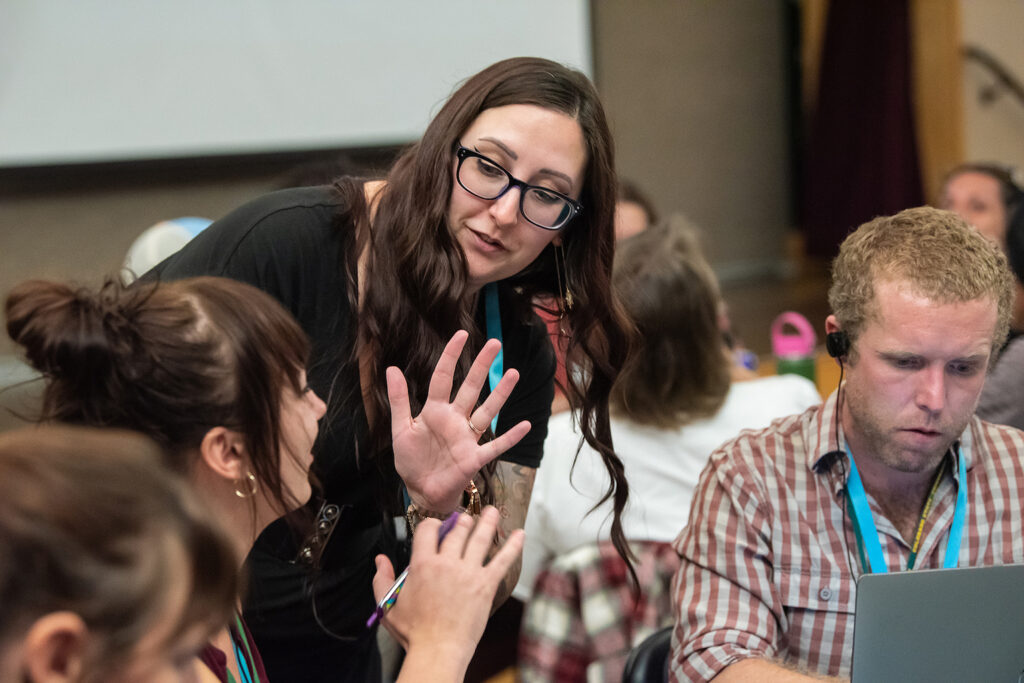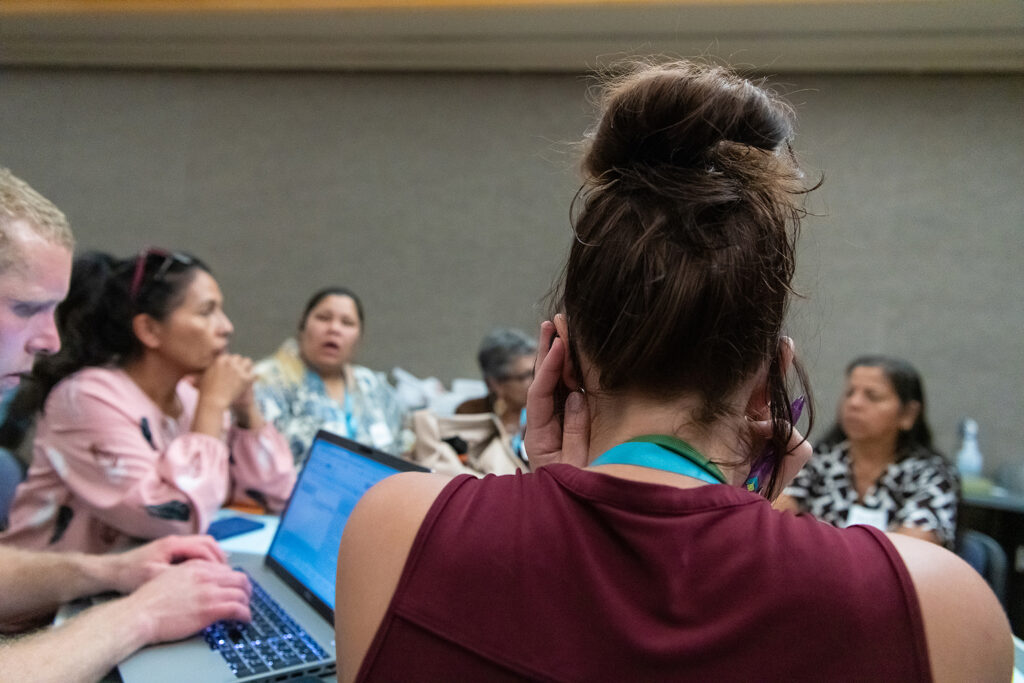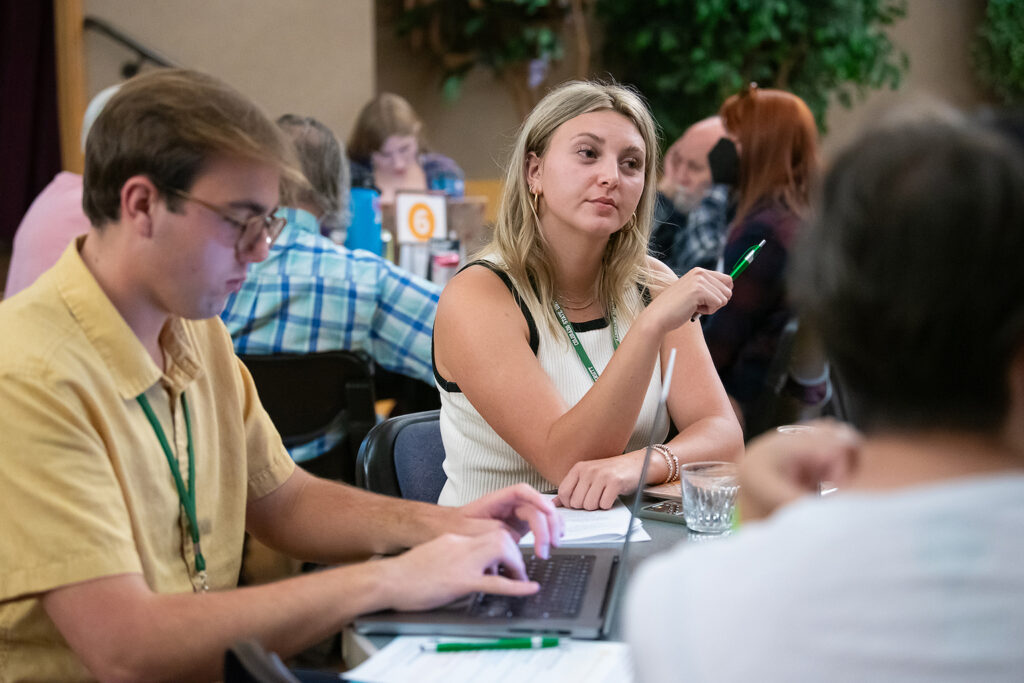
WE NEED TO TALK
Center is a foot soldier for local democracy
By Stacy Nick | Photography by Tanya Fabian
Jan. 3, 2024
Alexandria Hansen needed more chairs.
“I think we can fit eight or nine,” she said, pulling extras to a table made for six people.
But a crowded table was a good problem. Hansen is a graduate student in social work and an intern with CSU’s Center for Public Deliberation. On an evening in late September, she led a city of Fort Collins community meeting to gather opinions about transportation and economic health, and she had just learned that additional attendees requesting language translation would be joining the session.
The request, Hansen said, was a great sign that efforts to improve meeting access for Spanish-speaking residents were working – and having real influence in shaping the city’s policies and budgeting decisions. It’s exciting to see that impact, she said, adding, “I really want to focus on policy work and community change, and the Center for Public Deliberation has been a way to truly engage with our community and see those changes happen.”
The center is a key asset at Colorado State University in supporting local democracy and teaching students about democratic principles. Dedicated to impartial outreach, the Center for Public Deliberation provides trained facilitators to assist local governments, schools, and community organizations in problem- solving. The center’s projects involve research and guided group discussions about complex local issues that require deliberation to inform priorities and policymaking.
Since the Center for Public Deliberation began in 2006, it has facilitated more than 500 meetings for organizations ranging from municipalities to school districts and media outlets, said Martín Carcasson, founding director and a professor in communication studies. Meantime, the center has trained more than 500 students in all aspects of its work, so they are ready to function as foot soldiers for local democracy.
“My research has always been on, ‘How do we talk about tough issues?’” said Carcasson. “But I’ve also always been interested in the power of stories, the power of emotions, the power of values – basically how we talk to each other.”
The center grew from Carcasson’s frustration with the tendency of politics, particularly during elections, to reward arguments that speak to partisans, oversimplify complex issues, and blame the other side for problems, while punishing arguments that frame issues as more complex and attempt to bring people together. One of the first courses he taught at CSU was a debate class, and it was there that he saw an opportunity to quite literally change the conversation.
“Deliberation is just a different way of talking,” Carcasson said. “It’s talking about how we can work together versus simply who wins.”
Instead of debating an issue, students in his class created a discussion guide to help the community address an issue. That class then helped launch the Center for Public Deliberation. Initially, it was a way to give students more hands-on experience, but it quickly proved an effective tool for local organizations. The center’s first project was facilitating a conversation with Poudre School District. It ballooned from there.
“It’s really a fantastic partnership,” said Lawrence Pollack, city of Fort Collins budget director. “If the city were to try to replicate this with all the training and work the CPD does, we would have to create an entirely new program just to do that.”

Alexandria Hansen, an intern with the Center for Public Deliberation, is among about 500 CSU students who have learned about the workings of local government through the center. Here, she listens to the translated input of Spanish-speaking participants.
When she started college, Katie Patterson did not see herself as someone who would enjoy talking with community members about road construction and water infrastructure. Now, she does exactly that in her job as infrastructure communications manager with the city of Arvada.
“It was definitely not a path or career field I knew anything about,” said Patterson, a former student associate with the Center for Public Deliberation. “I realized that I really loved the idea of thinking about issues in a more complex way. That was what drew me in,” she said. “But what really sold me on it was that these are the things that impact people every day.”
That does not mean community conversations are easy.
“You definitely have to have thick skin sometimes and know that people care, and, sometimes, they just care loudly and deeply about something,” said Patterson, who earned a master’s degree in communication studies from CSU in 2020. “I think the CPD in a lot of ways has set me up to have that kind of empathy for where people are coming from.”
Like all students who work with the center, Patterson started as a note taker, learning how to listen before learning how to lead discussions as a student associate. Both allowed Patterson not only to learn more about engaging people in productive conversations, but also about local issues impacting her community.
“We kind of forget what the word ‘democracy’ really means because we kind of take it for granted,” she said. “People may feel like they don’t have a voice as a community member, and CPD flips that on its head and empowers people to share their perspectives and have those difficult conversations and inform the direction of their community.”
When people think of democracy, their first thought is elections, Carcasson said. But civic engagement and local problem- solving are likewise important.
“From a communication perspective, elections are often problematic. Elections are ‘winner take all,’” he said. “People together in a room working on a common problem, for me, that’s democracy – when we’re working with our neighbors, trying to cut across differences, trying to think about how we can better work together to address these problems.”
The center is collaborating with groups such as the Partnership for Age-Friendly Communities in Larimer County, the CSU Rural Action Project, and the CSU Deliberative Journalism Project to improve engagement in a variety of communities and with local media.
The center’s staff, which includes Associate Director Katherine Knobloch and Managing Director Sabrina Slagowski-Tipton, hopes to expand with a training arm that works with organizations across the country; with the Deliberative Journalism Project, it is developing an effective online news platform for discussions about local issues.

CSU students Patrick McCabe, left, and Siena DiGiacomo are among those leading a recent city of Fort Collins community meeting to gather input about local policies from residents.
For CSU alumna Kacey Bull, it was life-changing when a communications professor recommended her for a spot with the center. Bull soon discovered how to have conversations with people with differing perspectives. She also found a career path, later becoming director of outreach and communication for Healthy Democracy, a nonpartisan, nonprofit public deliberation organization.
“As a young person who’s really impassioned by a lot of causes, learning that your own voice is not the most important voice in the room – and that helping good conversation happen can be more productive than just screaming your piece into the void – was really powerful and definitely shaped my worldview,” said Bull, who graduated from CSU with a bachelor’s degree in communication studies in 2014.
Bull remembered a session she facilitated for the city of Fort Collins regarding the impending legalization of recreational marijuana. At her table sat an older woman who denounced drugs and believed anyone who wanted to legalize them was wrong. Also at the table were two men hoping to open recreational marijuana shops if the initiative passed. There was some passionate debate, Bull recalled. But at the end of the night, it was clear participants had found some common ground.
“I remember the older woman looking at the two men and saying, ‘You know what, I like you guys. You’re OK,’” Bull recalled. “You could tell that, for her, it was a really big compliment to just recognize their humanity and feel like they’re actually decent humans.”
Observing people with opposing views avoid vitriolic conflict and instead recognize each other’s humanity is “pretty magical,” Bull added. “That, I think, is one of the most exciting things that you learn at the CPD,” she said. “When everyday people are given the space and the structure and the reliable information that they need, they show up. They want to be there, and they come up with creative and practical solutions to our toughest problems.”
Photo at top: Sabrina Slagowski-Tipton, managing director for the CSU Center for Public Deliberation, works with students Alexandria Hansen and Sean Rau during a recent community meeting they coordinated for the city of Fort Collins.
SHARE
